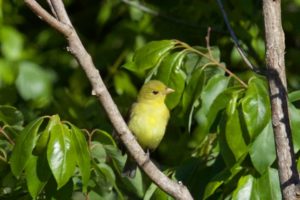by Jessica M Tinklenberg
Habitat. We’ve all heard the word, and most likely we all have a different idea of what it means. To most people, it’s just another vocabulary word learned in elementary school biology, with just a vague concept of what it implies. I study wildlife ecology, and for me, habitat is arguably the most important and foundational concept I deal with.
I track where birds go to get food and rest while they travel across continents during migration. These small birds can’t survive their journeys from wintering grounds to breeding grounds without habitats along the way to provide food, water, and shelter. Plants, animals, microbes, and humans all need clean air to breathe, safe places to live, good food to eat, and clean water to drink. The sum of all these things makes up a creature’s habitat. In essence then, habitat provides life.
Ecologists talk about two similar problems that can arise related to habitat. The first, habitat loss, is straightforward. If you lose habitat, whether cutting down a forest or converting grasslands to agriculture, you lose places for wildlife to live. The second, habitat fragmentation, is a little less intuitive. This is when large chunks of habitat get dissected into smaller pieces, like what happens if you smash a plate on the ground. In my home state of Indiana, this is an especially important concept. Agriculture and urban development have fragmented the forest that once covered the entire state, so that we’re left with a handful of tiny forest patches between the cornfields.
However, these woodlots and city parks can actually play important roles for migratory birds traveling through an area, allowing them to fill up on insects and fruit before continuing their migration north in spring and south in fall. The exciting thing is that these sites, often overlooked, have a lot of potential for conservation. In fact, your backyard can easily become a hotspot for wildlife. Native plants and bird feeders can provide opportunities to restore fragmented habitat into something beautiful and beneficial to both migratory and resident wildlife. It’s an opportunity to care for creation, something both A Rocha and I are passionate about.
I wasn’t always interested in actively conserving habitats for wildlife and humans. I did grow up knowing I wanted to go into the natural sciences–I was that kid who ate dirt as a toddler, played in the woods almost every day, and pored over field guides to learn as much as I could. However, I didn’t understand how my Christian faith could influence my interest in the natural sciences until recently.
It’s only now that I’m a graduate student dedicated to conserving the earth and educating students about the importance of habitat that I’ve connected the pieces. This is how I can use the skills God has given me in the natural sciences to practically serve people made in His image. Habitat matters. As Christians, we have an opportunity to show Christ’s redemption and restorative work, both to the people around us and to the world itself.
Jessica Tinklenberg is a Ph.D. student in wildlife ecology at Purdue University, studying songbird habitats during migration in Indiana. She received her bachelor’s degree from Taylor University in Indiana, and ultimately is passionate about getting others excited about studying and caring for God’s creation. Adapted from “Fragmented,” originally posted on Jessica’s blog.
For more information about creating a bird habitat in your own backyard, visit the birds page in the A Rocha Community.
Female Scarlet Tanager photo by Flo Paris Oakes









Amen! Great read and thanks for the reminder about habitat. As a minister and creation care naturalist, I too am seeking ways that I can combine these two passions to help restore people and places.